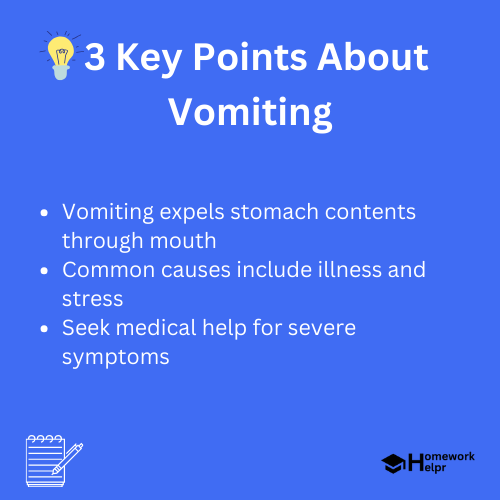📝 Summary
Vomiting, or emesis, is a critical physiological reflex that involves expelling contents from the stomach through the mouth. Triggered by factors such as illness, food intolerances, or emotional stress, this complex process starts with retroperistalsis and is controlled by neurological signals from the brain’s vomiting center. Common symptoms accompanying vomiting include nausea, abdominal pain, and dehydration. Treatment entails rest, hydration, over-the-counter medications, and seeking medical attention if symptoms persist or worsen. Home remedies like ginger and apples cider vinegar can also mitigate nausea. Understanding vomiting allows for improved management of this protective body response.
Vomiting: Understanding the Body’s Response
Vomiting, also known as emesis, is a complex physiological reflex that serves a critical purpose for our body. When we vomit, we expel contents from our stomach through the mouth. This process can be triggered by various factors, including illness, food intolerances, or even emotional stress. Understanding the reasons behind vomiting can help us deal with it more effectively.
1. The Mechanism of Vomiting
The act of vomiting involves a series of coordinated movements. It starts with retroperistalsis, where the muscles of the stomach contract in reverse, pushing the contents upward towards the esophagus. Neurological signals are generated in the brain, specifically the vomiting center located in the medulla oblongata. These signals prepare the body for the forceful expulsion of stomach contents.
Definition
Neurological: Relating to the nervous system, which includes the brain, spinal cord, and nerves that coordinate actions and sensations.
During vomiting, various muscles play crucial roles:
- The diaphragm contracts, increasing the pressure within the abdomen.
- The muscles at the top of the stomach relax, allowing contents to flow backward into the esophagus.
- Finally, the muscles of the throat and mouth contract to expel the stomach’s contents.

2. Causes of Vomiting
Vomiting can arise from multiple sources, and understanding these can help in finding treatments and remedies. Common causes include:
- Illness: This includes viral or bacterial infections, such as gastroenteritis.
- Motion sickness: Often experienced during travel, where the body senses conflicting signals between the inner ear and eyes.
- Food intolerance: Certain foods can trigger nausea leading to vomiting.
- Emotional stress: Anxiety or overwhelming feelings can also be a cause.
💡Did You Know?
Did you know that vomiting can also be a protective mechanism? It helps eject harmful substances from the body, such as spoiled food or toxic chemicals.
3. Symptoms Associated with Vomiting
Vomiting often comes accompanied by various symptoms, which can vary in nature. Some common symptoms include:
- Nausea: A feeling of unease and discomfort in the stomach.
- Abdominal pain: Often experienced before or after vomiting.
- Diarrhea: Sometimes accompanies vomiting, especially in cases of infection.
- Dehydration: Prolonged vomiting can result in a loss of fluids and electrolytes.
Definition
Dehydration: A condition resulting from excessive loss of fluids from the body, leading to symptoms such as weakness, dizziness, or confusion.
4. Management and Treatment
When vomiting occurs, it is essential to take immediate action. Here are several measures to manage and treat vomiting:
- Rest: Give the body time to recover and avoid any strenuous activity.
- Hydration: Consuming clear liquids is crucial to replenish lost fluids. Sports drinks or oral rehydration solutions can be beneficial.
- Medications: Over-the-counter medications like anti-nausea drugs can help alleviate symptoms.
- Seek medical attention: If vomiting persists for more than 24 hours or is accompanied by severe symptoms like high fever, blood in vomit, or severe pain.
Example
For instance, if a child has vomiting due to a viral infection, it’s essential they stay hydrated with water or an electrolyte solution instead of solid foods until they feel better.
5. Home Remedies for Vomiting
Some home remedies can help alleviate the feeling of nausea and vomiting. These remedies often utilize natural ingredients that are gentle on the stomach:
- Ginger: Consuming ginger tea or chewing on raw ginger can reduce nausea.
- Apple cider vinegar: Diluting it in water can help settle the stomach.
- Bananas: They are easy on the stomach and can help restore potassium levels.
Example
For example, if someone feels nauseated, they could sip ginger tea slowly to combat the urge to vomit.
6. When to Seek Medical Help
It is crucial to recognize when vomiting might require professional medical attention. Some warning signs to look for include:
- Persistent vomiting: If vomiting lasts more than 24 hours.
- Blood: Finding blood in vomit can be a serious sign of upper gastrointestinal bleeding.
- Severe dehydration: Symptoms include extreme thirst, less frequent urination, dizziness, and dark urine.
- Severe pain: Such as crushing pain in the stomach or sides.
Definition
Gastrointestinal: Related to the stomach and intestines, often involving digestion processes or disorders associated with the digestive system.
Conclusion
In conclusion, vomiting is a multifaceted body reaction that is both a symptom and a mechanism for protecting our body from harm. By understanding its causes, symptoms, and management techniques, individuals can better handle instances of vomiting and provide the necessary care for themselves or those around them. Always remember, if symptoms persist, seeking medical advice is crucial for maintaining overall health.
Related Questions on Vomiting
What is vomiting?
Answer: Vomiting, or emesis, is the expulsion of stomach contents through the mouth due to various triggers such as illness or stress.
What are the common causes of vomiting?
Answer: Common causes include illness (like gastroenteritis), motion sickness, food intolerance, and emotional stress.
What symptoms are associated with vomiting?
Answer: Symptoms can include nausea, abdominal pain, diarrhea, and dehydration.
When should I seek medical help for vomiting?
Answer: Seek medical attention if vomiting persists for more than 24 hours, if blood is present in the vomit, or if severe symptoms like dehydration occur.
